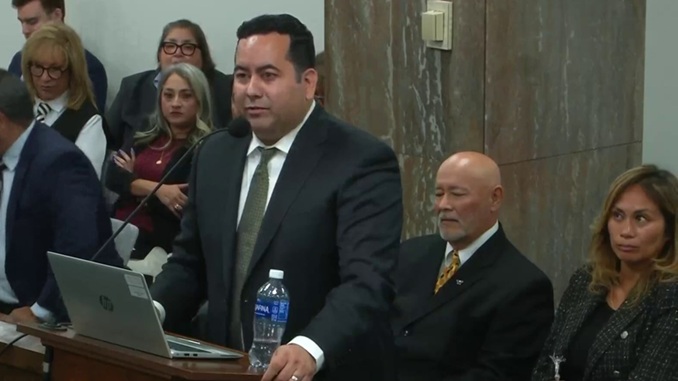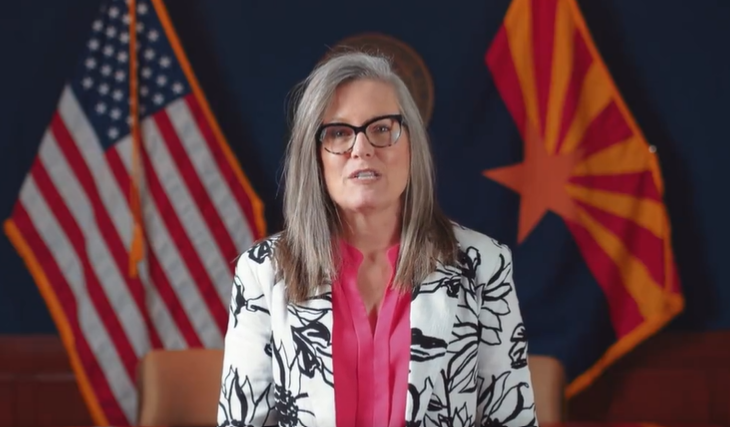
by Jonathan Eberle | Oct 1, 2025 | Education, News
By Jonathan Eberle |
A dispute over public records has emerged between state lawmakers and the Tolleson Union High School District, after the district declined to provide financial transaction records requested by the Legislature.
The conflict began after a July 21 Joint Legislative Audit Committee (JLAC) hearing on school district finances. Committee Co-Chairman Rep. Matt Gress (R–LD4) followed up with a formal request on August 26 seeking two years of financial records, including purchase orders, contracts, and payments to vendors.
Instead of complying, the district responded by refusing to release electronic records and imposing more than $26,000 in fees for hard copies—charges Gress argues are intended to deter requests. State law allows agencies to charge for the actual cost of copying or mailing records, but not for producing electronic files.
In a September 17 letter, Gress accused the district of setting “a dangerous and unacceptable precedent” by blocking access to basic financial information. He described the district’s stance as unprecedented, saying that other Arizona school districts have provided similar data without incident.
“Exporting purchase orders from financial software is simple, and other districts have complied quickly,” Gress said. “This refusal denies lawmakers the basic financial information needed to evaluate reforms and ensure tax dollars are spent responsibly.”
The lawmaker also raised concerns about the district’s reported consultation with the Arizona Attorney General’s Office. Gress noted that Attorney General Kris Mayes has previously provided records to the Legislature when her own office was under review. “It would be deeply troubling,” he said, if the Attorney General advised a district to withhold documents from legislative oversight.
In correspondence with the district, Gress emphasized that Arizona law (A.R.S. § 39-121 et seq.) grants the public the right to inspect government records and restricts fees to copying or mailing costs. He criticized the district’s explanation that the charges were meant to compensate staff time and discourage what it called “unreasonable” requests.
Jonathan Eberle is a reporter for AZ Free News. You can send him news tips using this link.

by Ethan Faverino | Oct 1, 2025 | News
By Ethan Faverino |
Arizona State Representative Walt Blackman, Chairman of the House Government Committee, urged Governor Hobbs to declare a State of Emergency in Gila County following catastrophic flooding. The flooding that began on Thursday, September 25, 2025, has already claimed at least three lives, with one still missing.
Hobbs waited days before declaring an emergency, finally declaring one on Saturday, September 27.
The floods have washed away vehicles, damaged historic buildings, and scattered hazardous debris, leaving the communities in a state of disaster.
Search and rescue operations, supported by the Arizona Department of Forestry and Fire Management, Arizona Department of Public Safety (AZDPS), and cadaver dogs, continue across Globe and Gila County.
“The people of Gila County are facing a disaster that has taken lives, destroyed homes and businesses, and left our communities in crisis,” said Representative Blackman. “I am in constant contact with local and state officials and working around the clock to make sure families get the help they need. I urge Governor Hobbs to act immediately so state resources can be mobilized for rescue, recovery, and rebuilding.
He added, “Gila County residents need help now. I am calling on the Governor to issue this declaration without delay. Every hour counts when lives and property are at risk.”
The state’s emergency operation center is operating at level 1 with 24-hour staffing from 20 agencies and over 45 personnel.
Globe Mayor Al Gameros confirmed three deaths and one missing as of Monday, September 29, 2025.
“This morning (Sunday), we brought in an incident command team, type 3 team from the state, and they bring in so many resources,” said Mayor Gameros. “They bring in over 150 team members … We also have helicopters on standby.”
Ethan Faverino is a reporter for AZ Free News. You can send him news tips using this link.

by Staff Reporter | Oct 1, 2025 | Education, News
By Staff Reporter |
Superintendent Tom Horne and Treasurer Kimberly Yee are at odds over a sizeable loan to a school district.
Horne wants Yee to approve a $3 million cash advance to Nadaburg Unified School District (NUSD), located inside Wittman. He stated in a Monday press release that Yee failed to conduct a proper review of the district’s finances before denying the advance.
The superintendent cleared up previous reports of a projected deficit as a “clerical error.” Horne called Yee’s denial “irresponsible” and urged her to reconsider.
“Our Finance Division did its research and determined that Nadaburg is operating within its budget, and by the end of the year they will have a projected positive cash balance of $1.3 million. Initially it was thought that they would have a negative cash balance at the end of the year, but the Department of Education, being a service institution, checked the forms and found the district made an unintentional clerical error that they can correct,” said Horne. “The Treasurer could have done the same review because she has the necessary forms, which were provided to her by our office, and her office failed to follow up with us to determine why we approved the advance.”
Yee not only denied the district a $3 million cash advance to address a $5 million deficit, she asked the Joint Legislative Audit Committee to direct a special investigation of the district through the Auditor General. The reported deficit amounted to three times the total amount of revenue NUSD anticipates from property taxes.
Yee’s announcement came last week, several days before Horne issued his response.
The treasurer expressed concern that Horne and the Arizona Department of Education had approved an advance to a district “in considerable financial crisis.” Although Horne alleges Yee failed to conduct a proper review of NUSD finances, Yee claimed in that preceding press release that she identified poor financial practices.
“The state’s top education agency should have been able to identify, as the Arizona Treasury has, that this District may desperately need financial experts to bring their books into the black,” said Yee.
In the denial letter to NUSD Superintendent Aspasia Angelou, Yee said the district failed to justify the necessity of the expenses the advance would cover and failed to show efforts to reduce current expenses to the minimum.
“[This] raises concern that the deficit is not necessary due to the timing of property tax collections, but could potentially be indicative of gross financial mismanagement,” said Yee. “[Our office] is seriously concerned that an advancement of funds now will only compound the district’s deficit and harm the financial stability of the district for years to come.”
In his Monday press release, Horne dismissed Yee’s claim of financial mismanagement as lacking any evidence. Rather than evidence of impropriety, Horne said the request was normal.
“District cash advances are common because a school district’s income and expenses may fluctuate,” said Horne. “As long as the district’s cash position is positive by the end of the year, and the funds will be paid back, cash advances are allowable.”
NUSD cited a low ending fund balance from the prior fiscal year and decreased property tax collections in 2024 as the main reasons for the deficit.
There are nearly 1,500 students in NUSD.
AZ Free News is your #1 source for Arizona news and politics. You can send us news tips using this link.

by Ethan Faverino | Sep 30, 2025 | News
By Ethan Faverino |
Congressman Andy Biggs (AZ-05) is the clear frontrunner in the Arizona Republican gubernatorial primary, leading businesswoman Karrin Taylor Robson by a 24-point margin, according to an exclusive Pulse Decision Science poll.
The survey conducted September 8-10, 2025, among 502 likely Republican primary voters, shows Biggs commanding 55% of the vote compared to Robson’s 31%, with 14% of voters undecided.
The poll highlights Biggs’ strong position as he and Robson look to challenge incumbent Governor Katie Hobbs in the 2026 general election.
If Rep. David Schweikert (AZ-01) were to enter the race, the survey indicates he would place third with just 11% of the vote, while Biggs maintains a 22-point lead over Robson, in a three-way contest, getting 48% to Robson’s 26% and Schweikert’s 11% with 15% undecided.
In a head-to-head matchup, if Robson dropped out of the race, Biggs would still be on top with 61% to Schweikert’s 23%.
“Congressman Andy Biggs enters August as the clear favorite in the GOP Primary Election and stands well-positioned as the strongest candidate to defeat Katie Hobbs in November 2026,” said Drew Sexton, a spokesperson for Biggs. “He’s the only candidate to be endorsed by President Donald J. Trump and Charlie Kirk, the only candidate with an impeccable conservative voting record, and the only candidate with the governing experience at the state and federal level to provide strong leadership for Arizona from Day One.”
Biggs’ campaign is further booming, with Turning Point USA’s PAC investing around $500,000 in his favor, as announced back in June.
Rep. Eli Crane (AZ-02) noted that Biggs can effectively spread conservative messages without creating enemies.
“I don’t know if you’ve ever spent much time with Biggs. But unlike a lot of America First fire-breathers that fire up the crowd, Biggs is kind of a happy warrior,” said Crane. “He’s got friends everywhere, and it’s not to say that there are some people that you know are in opposition to him, but he doesn’t pick personal fights with people. He keeps everything professional.”
Ethan Faverino is a reporter for AZ Free News. You can send him news tips using this link.

by Staff Reporter | Sep 30, 2025 | News
By Staff Reporter |
Governor Katie Hobbs has rejected the Federal Drug Administration’s restrictions on the new COVID-19 vaccine.
The FDA limited administration of the 2025-26 formula for the COVID-19 vaccine to individuals 65 and older. However, last week, Hobbs issued an executive order expanding access to anyone over the age of six months old.
The governor claimed she issued the executive order to ensure Arizonans’ health and safety.
In explanations of its August announcement to the media, the FDA explained it recommended limitations on the newest vaccine formula in order to address safety and efficacy concerns.
“The American people demanded science, safety, and common sense,” said Secretary Robert Kennedy. “This framework delivers all three.”
In a May report, FDA Commissioner Marty Makary and FDA Center for Biologics Evaluation and Research Director Vinay Prasad recommended randomized clinical trials to prove the vaccines’ safety and efficacy.
The FDA did recommend allowing immunization to those as young as six months on the condition that they have “at least one underlying condition” rendering them “at high risk for severe outcomes from COVID-19.”
The CDC defines these underlying conditions to include: Asthma; cancers; cerebrovascular disease; chronic kidney disease; chronic lung diseases limited to bronchiectasis, COPD, interstitial lung disease, pulmonary embolism, pulmonary hypertension; chronic liver diseases limited to cirrhosis, non-alcoholic fatty liver disease, alcoholic liver disease, autoimmune hepatitis; cystic fibrosis; diabetes; heart conditions such as heart failure, coronary artery disease, or cardiomyopathies; HIV; mental health conditions limited to mood disorders including depression and schizophrenia spectrum disorders; neurologic conditions limited to dementia and Parkinson’s disease; obesity; physical inactivity; pregnancy; primary immunodeficiencies; smoking, current and former; solid organ or blood stem cell transplantation; tuberculosis; use of corticosteroids or immunosuppressive medications; epilepsy; hemophilia; sickle cell disease; and substance use disorder.
Despite the conflict with FDA recommendations, the Arizona Department of Health Services (ADHS) teamed up with Hobbs to expand eligibility to those as young as six months in Arizona.
ADHS determined outside FDA recommendations that the the Moderna Spikevax is appropriate for children aged six months to 11 years, the Pfizer BioNTech (Comirnaty) is appropriate for children aged five to 11 years, and the Moderna (Spikevax), Novavax (Nuvaxovid), and Moderna (mNEXSPIKE) are appropriate for children 12 years and older.
Dr. Richard Carmona, ADHS Public Health Medical Advisor and former U.S. Surgeon General, indicated the 2025-26 formulation was as safe and effective as prior formulations.
“Vaccines are one of the most important tools we have to protect our communities,” said Carmona. “The COVID-19 vaccine has proven to be safe and effective at preventing severe illness, hospitalization, and death. Vaccines help us limit the spread of disease and reduce pressure on our healthcare system.”
ADHS interim director Sheila Sjolander called the updated FDA recommendations a “confusion” that the governor and ADHS clarified.
“We understand the federal changes have caused confusion about eligibility for vaccination,” said Sjolander. “We are committed to keeping the public updated on our recommendations throughout this respiratory season. ADHS has updated our website with the latest information on what the standing order means for Arizonans.”
AZ Free News is your #1 source for Arizona news and politics. You can send us news tips using this link.





